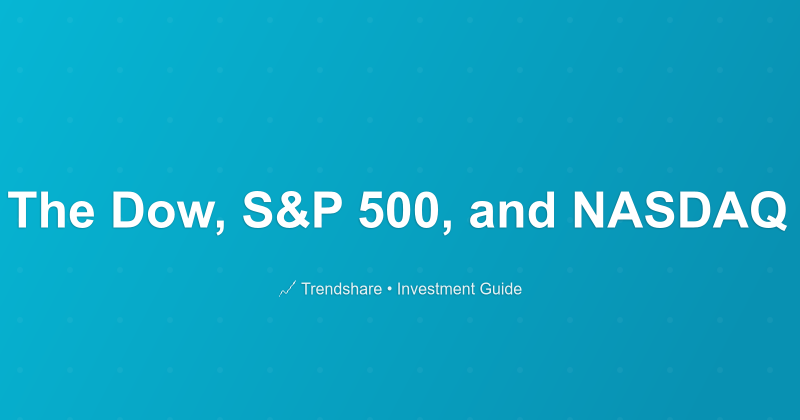
What are The Dow, S&P 500, and NASDAQ Indexes?
By Ethan Mercer
Financial Technology Analyst • 10+ years in fintech and payments
What is the Dow? What is the NASDAQ? What is the S&P 500? An overview of three influential stock market indexes.
When people talk about how the market did on a given day, they probably throw around terms like "The Dow" and "NASDAQ" and "S&P 500". These are beautifully simple things that represent a fraction of the market as a whole, but they're useful fibs on their own.
Each of these three represents a carefully chosen collection of public companies. For example, the Dow Jones Industrial Average contains 30 American companies such as Boeing, IBM, and Wal-Mart. The S&P 500 contains 500 very large American companies. The NASDAQ has over 3000 companies. The total market of stocks you can buy and sell is much, much bigger than these three indexes, but each index represents something unique.
What's a Stock Market Index?
Every stock market index has a specific goal. It may be to identify stocks in a particular geographic reason (such as the Oregonian Index). It may be to group stocks of a particular sector or business type (automotive stocks, financial stocks). By grouping stocks together, it's possible to analyze broader trends of businesses: the steel market is doing well this year, the eastern region of Canada appears to be suffering an economic slow down, et cetera.
An index doesn't and cannot represent the entirety of the market (unless it's a whole market index), but it can give you interesting information.
What is the Dow Jones Industrial Average?
The Dow Jones Industrial Average (or just "the Dow") is an index of 30 of the largest public companies in American business. Unlike many other indexes, the single number that goes up or down every day is price-weighted index, where the price of every individual stock (in isolation of other factors) affects the daily fluctuation of the stocks. Thus if the prices of some member stocks go up more than the prices of other member stocks go down, the Dow value goes up. Easy, right?
The Dow applies a formula to attempt to guide the index to a historical norm: for every dollar change to the price of a stock within the Dow, the Dow moves by about 7.6 points. This multiplier can and will change.
The Dow has its flaws, in that it contains only 30 hand-selected stocks—and those stocks can change over time. It doesn't represent the overall market. It also contains only the stocks of huge companies. Worse yet, it ignores the fact that a $1 change in the price of a stock under $10 is more significant than a $1 change in the price of a stock over $100. Yet it's still a popular measure of market performance.
What is the S&P 500?
The S&P 500 index is a larger group of the stocks of 500 companies, selected to represent the American economy in total. Unlike the price-weighted dow, the S&P 500 reflects the amount of total money invested in each stock. That is to say, a company with 10 public shares worth $10 each has much less effect on the value of the index than a company with 100 public shares worth $10 each.
The S&P 500 index is the gold standard of performance of an index fund or mutual fund. If you can beat it reliably, great! Otherwise, stick your money in an index fund tracking the S&P 500 and be done with it. Averaged over decades, expect a return of 6-8% a year. Maybe you'll get 10%. That's decent!
What is the NASDAQ?
The NASDAQ composite index contains stocks listed on the NASDAQ stock exchange (similar to but different from the New York Stock Exchange). It's broader than either of the other two mentioned indexes. It's relevant because the NASDAQ exchange is even busier than the NYSE and it's the home to a lot of technology stocks.
Where the DJIA tracks the largest American businesses and the S&P 500 tracks a broad section of big American businesses, the NASDAQ is a grabbag of all sorts of market activity: big companies, small companies, up and comers, et cetera. It's less predictable than the blue chips of the Dow or the reliable bellwether S&P 500.
That unpredictability can make it more interesting, but "interesting" isn't necessarily a prime goal in investing.
Investment Disclaimer
This article is for educational purposes only and does not constitute investment advice. Stock prices, financial metrics, and market conditions change constantly. Company examples are provided for illustration and should not be considered recommendations. Always verify current data from official sources such as company investor relations pages or SEC filings, assess your own risk tolerance and investment objectives, and consult a qualified financial advisor before making investment decisions. Past performance does not guarantee future results.